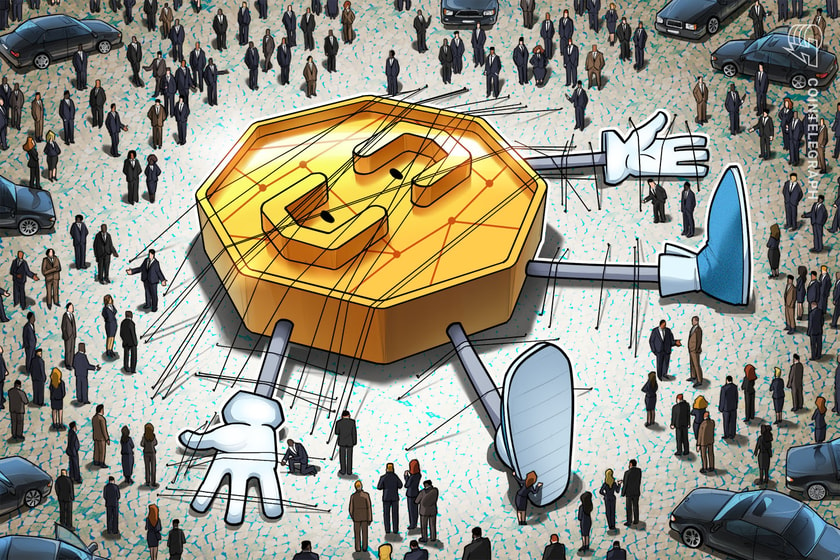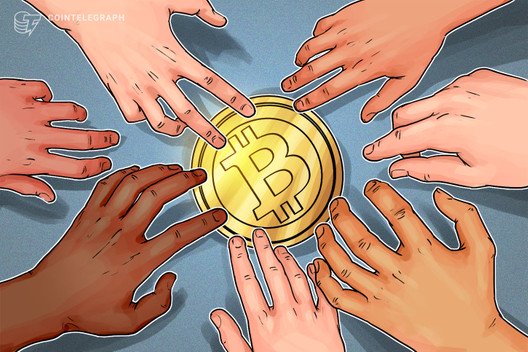Will crypto and blockchain shape the future of finance? Experts answer
This is Part Two of a multipart series on blockchain and crypto in China. Read Part One about the digital yuan here.
When Satoshi Nakamoto introduced the Bitcoin (BTC) white paper over a decade ago, it was hard to imagine what role the cryptocurrency sector would play in global finance. Some argue that the invention of blockchain technology is comparable to the revolution brought on by the invention of the internet back in the 1980s. Starting as a niche space for tech enthusiasts, in just 12 years Bitcoin has become a serious player in the financial field, with its market capitalization closing in on Google, one of the world’s largest tech giants.
Related: Did Bitcoin prove itself to be a reliable store of value in 2020? Experts answer
One of the reasons for the increasing popularity of, and people’s increasing interest in, crypto lies in the fact that the technology that forms the backbone of cryptocurrency promises more financial inclusion compared with legacy finance. It is especially important for developing countries and emerging markets with fast-growing economic potential — the regions with the most promising potential for mass crypto adoption. And while blockchain cannot solve all of society’s problems, it’s the community behind this industry that should address the factors causing financial exclusion. Being decentralized in its origins and driven by the community, the crypto industry indeed greatly prioritizes diversity and inclusion, including valuing the contributions of women and the LBGTQ+ community.
Related: Women, decentralization and the world’s economic drive: Experts answer
The general public discourse on the crypto space still suffers from the notorious reputation of the Silk Road saga and the ICO craze back in 2017 — 80% of initial coin offerings ended up being scams. Meanwhile, by appealing to the younger generations — who will soon enough be the major drivers of the world’s economy — crypto is certainly gaining its momentum. Just last year, PayPal, the world’s largest payments processor, announced it would allow its customers to buy, sell and hold cryptocurrencies, and the demand for that service has been greater than the company expected.
Related: Will PayPal’s crypto integration bring crypto to the masses? Experts answer
Also last year, the world witnessed the rise of the decentralized finance industry, and some even argue that DeFi will complete what Bitcoin started, proving “to be the guarantee of a better, more liberated future.” DeFi has become a symptom of the real shift from centralized to decentralized services, fueling massive innovation and growth in Web 3.0 protocols and the demand for the decentralized internet. Since the old financial system has rotted and degenerated, we have witnessed an unprecedented amount of money-printing by governments all over the world amid the COVID-19 pandemic. DeFi brings forward the prospect of a paradigm shift, promising not just the democratization of money but the democratization of finance, representing a seismic shift in the way people will bank in the future.
Related: How has the COVID-19 pandemic affected the crypto space? Experts answer
Due to its decentralized nature, the crypto industry is not and will never be a local trend — the changes that it causes to the financial landscape are global. With central bank digital currencies, or CBDCs, being researched by governments all over the world and more institutional players — such as MicroStrategy, Mastercard, Bank of New York Mellon, Tesla and many others — entering the space, it seems inevitable that the global economy will have to accept that crypto, and the technology behind it, is here to stay. These examples also clearly represent signs that the industry is maturing.
Related: Tesla, Bitcoin and the crypto space: The show Musk go on? Experts answer
Meanwhile, not all countries treat crypto equally: India has had a difficult relationship with the crypto space for some time already; China is leading CBDC development; the European Commission has proposed its Markets in Crypto-Assets Regulation, which has raised concerns within the crypto industry; and in the United States, while the crypto space is hopeful about new appointments in the administration of President Joe Biden, regulators are tightening the belts for crypto users. Cointelegraph decided to reach out to experts from China in the blockchain and crypto space for their opinions on the following question: What role will emerging technologies — such as blockchain, crypto and DeFi — play in shaping the future of finance in the world in general and in China specifically?
Bobby Lee, founder and CEO of Ballet:
“I think the way that blockchain and crypto have changed finance globally is by essentially introducing a brand-new asset class. Traditionally, the world only had gold and silver. After that, we had the invention of paper money, which became currency, and that was a new asset class. And then after a few more hundreds of years, the invention of stocks. Equity stocks in a company became the notion of ownership in the company, so stocks became an asset class. And of course, we’ve had loans and bonds. So, whether it’s government or corporate bonds, that’s another asset class.
And what we’re seeing with crypto for 12 years now is that we have Bitcoin and now a new asset class called digital currency. Now, it’s called digital currency, but it really doesn’t have to be used like currency. It should be just treated like a new asset class. But why do we need that new asset class?
The issue with paper currency is that people in power always want to change rules to sort of strengthen their power over and hold on the economy, and thus over the people. So, they introduce the notion of unlimited printing. And this was only introduced in 1971. We’re now at the 50-year anniversary of this new kind of asset class, which has a new feature: unlimited printing. Pretty much, before 50 years ago, the U.S. dollar did not have unlimited printing because it was backed by gold. So, you couldn’t have unlimited printing, but now you can have a little bit of printing because you’ve uncoupled from gold. Fiat currency has changed.
And now because of its change, the world’s locomotive has introduced a new asset class called Bitcoin, which is meant to counterbalance the change in fiat currency — to give people and give the world a choice. Do you want to continue to use an asset class that keeps on printing with no limit? Or would you prefer to put your savings at value into an asset class that has a strict upper limit of 21 million units? That’s what crypto is bringing to the world.
Important questions are: Who wins? Who’s right? Who’s wrong? I think crypto will win because of its limited issuance, strictly limited in nature. My thoughts on Bitcoin as an asset class can be read in my book The Promise of Bitcoin: The Future of Money and How It Can Work for You. Cryptocurrency is bringing to the world the notion of a new asset class. And it’s also bringing balance back to the world because before Bitcoin, the most relevant form of money was currency issued by governments, what we call fiat currency, and crypto has changed the very nature of it.”
Chang Jia, founder of Bytom and 8btc:
“First of all, the digital yuan mentioned in the first article, which integrates the cutting-edge blockchain technology and cryptography technology, has started to carry out the application in several first-tier cities in China. One could say that DCEP is already serving the national economy and the people’s livelihood. The prototype of China’s future financial network is gradually emerging. Therefore, in terms of digital finance, China is in a leading position over the world.
For the world, blockchain technology has a major mission in the future, including promoting currency internationalization, trade globalization and a better structure for the world’s top-level financial system to avoid the recurrence of a financial crisis.
At present, we can perceive that Bitcoin created by blockchain technology is becoming the preferred hedging asset of mainstream finance and has reached a market value of 1 trillion U.S. dollars within a short decade.
In the long process of financial evolution, Bitcoin and other high-quality cryptocurrencies will bring a new logical switch and asset portfolio to the world from the nature of currency and finance.”
Da Hongfei, founder of Neo, founder and CEO of Onchain:
“The ongoing DeFi boom has proven that blockchain technology is here to stay. From my perspective, dissatisfaction with traditional financial institutions is mounting while DeFi has boomed due to its ability to offer people — ordinary people with varying levels of blockchain experience — unparalleled returns, efficiency and transparency.
In China and around the world, I believe blockchain technologies will play a key role in paving the way for the smart economy of the future as increasingly more people — and institutions — invest in it.
Moving forward, I believe flexible governance is key for driving blockchain’s sustainable development by delivering a means for platforms and communities to flexibly and quickly adapt to the digital economy market needs and regulations of various countries.”
Daniel Lv, co-founder of Nervos:
“China has its own vision for using the technology: It wants to use blockchain to improve data sharing, optimize business processes, reduce operating costs, and establish better credit systems to solve common problems in small and medium-sized enterprise finance — bank risk control, legal supervision, etc.
Globally, crypto and DeFi will make financial services more equitable, specifically for people — such as the unbanked — who traditional financial institutions have overlooked. We’ll also see blockchain technology continue to grow and eventually become as ubiquitous as the internet — adopted by every industry for many different purposes.”
Discus Fish, co-founder of F2Pool and Cobo:
“Recently, everyone has been paying close attention to the movement of retail investors against Wall Street financial institutions on the subreddit r/wallstreetbets. As a representative of securities platforms, Robin Hood could restrict retail trading and even force users to sell. Once again, this makes us realize the importance of decentralized finance. In less-developed areas and developed ones, there are more and more people who need decentralized finance.
In the past year, with the rapid development of new blockchain technology — represented by DeFi — financial decentralization became more than just a dream. It can provide financial services for people in less-developed areas and enable people all over the world to experience more transparent and fair financial products and services. People can choose financial service providers according to their demand for financial products and fully enjoy a variety of truly decentralized and rich financial ecology.
The impact of blockchain technology on traditional finance will be greater than the impact of current financial technology on the banking industry. It will also force the reform of the entire financial industry and is expected to redistribute the pattern of the sector.”
Kevin Chou, co-founder and CEO of Rally:
“Crypto is beginning to replace obsolete aspects of traditional finance, but it’s also bringing completely new functionality to the sector. We’re already seeing crypto replace aging pieces of the traditional financial system, from crypto remittances between the U.S. and Mexico that significantly reduce costs to lending protocols on Ethereum that don’t require a counterparty.
But beyond that, we’re seeing entirely new financial tools that didn’t previously exist emerging with the rise of crypto and blockchain. One example is social tokens, which allow influencers to monetize their brand and bring their communities along for the ride. Improving the economics between creators and fans can be the key to unlocking a household-supporting income for millions of creators around the world.
All of these developments are particularly important in regions like China and greater Asia. If crypto companies can navigate the regulatory constraints in these regions, it could be life-changing for millions of people.”
Kevin Shao, co-founder of Bitrise Capital:
“Blockchain is a technological change without borders. Every country in the world should embrace the advent of new technologies. Both the West and China should actively absorb new technologies and apply them to our society.
Blockchain has played an innovative role in certain fields, such as state governance, social credit investigation, product traceability and information notarization. In these areas, we believe that the West and China are very important.
At the same time, we are also exploring the development of blockchain in the financial field. Of course, compared with other industries, finance has a higher level of importance in the system. Therefore, whether it is in the West or China, the application of blockchain in the financial field should be most cautious.”
Yat Siu, chairman and co-founder of Animoca Brands:
“DeFi will shape finance in incredibly fundamental ways. Perhaps the biggest way (including in China) is in financial education. By this, I mean a common knowledge and understanding of finance that has traditionally been confined to an elite economic class.
We and many others in the decentralized movement are building a future where our kids will be financially savvy by the time they start college, with their own investment portfolios and a strong basis of financial awareness. Maybe these kids will even be in a position to pay for their own education, thanks to the knowledge they gain by participating in the decentralized ecosystem.
Imagine a world where financial inclusion is not just about having a bank account, but about being able to easily and effectively participate in various capital opportunities, take advantage of things like staking, yield farming or exchange rates, or simply being able to invest in a project you like.
Financial knowledge is one of the few things that have not broadly improved with the rise of Web 1.0 and 2.0. The rise of blockchain is changing that.”
Several interviewees were featured in Cointelegraph China’s Top 100 Notable People in Blockchain of 2020. Cointelegraph China contributed to four interviews.
These quotes have been edited and condensed.
The views, thoughts and opinions expressed here are the authors’ alone and do not necessarily reflect or represent the views and opinions of Cointelegraph.
This article does not contain investment advice or recommendations. Every investment and trading move involves risk, and readers should conduct their own research when making a decision.









